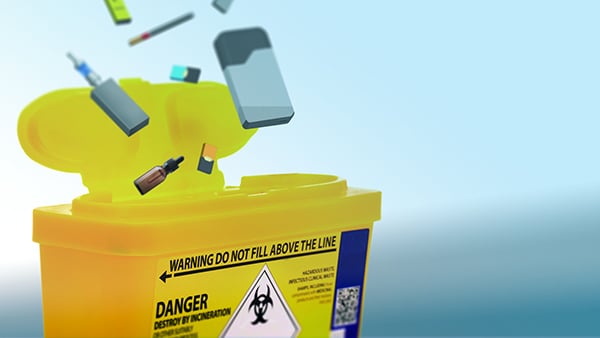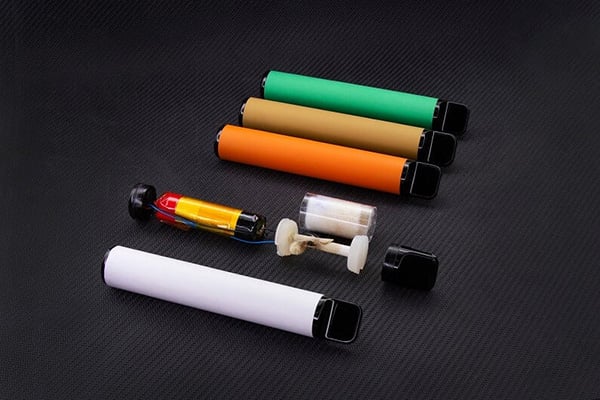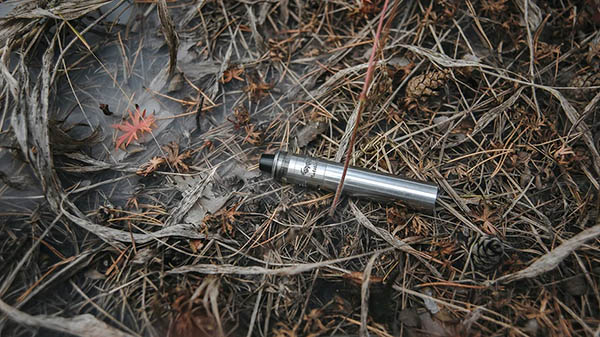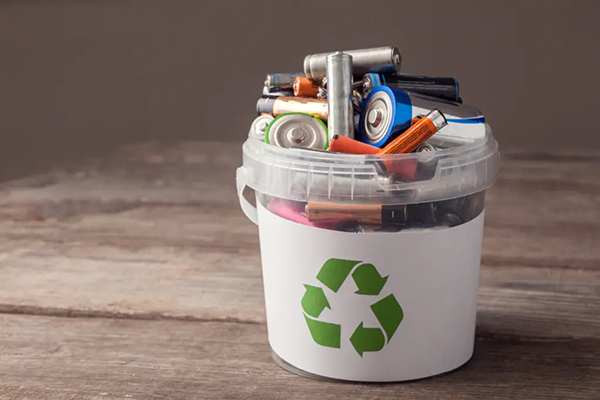How to dispose of your vape pen battery
How to dispose of your vape pen battery

It's not just traditional cigarettes that are polluting our landfills. Properly disposing of e-cigarette batteries is one of the most important things a vape user or business owner can do.
While vape pens do save rolls of paper (and trees), simply throwing the pen in the garbage after you have finished with it can have disastrous consequences for the environment and human health.
Nicotine Is a Hazardous Waste
Nicotine, including nicotine salt, is listed as hazardous waste by the Environmental Protection Agency (EPA).
Discarded vapes containing these hazardous substances can lead to unintentional exposure to nicotine. Poison control centers receive thousands of calls from people every year about exposure to e-liquid, which can be fatal to children, pets, and even adults.
Improper disposal of e-cigs and vaping products can also harm the environment as these chemicals can escape into the ground and water, harming wildlife and humans.
Lithium-ion batteries

Lithium-ion batteries were first used in Sony camcorders in the early 90s and revolutionized energy storage and use. Unlike standard AAA batteries, which use zinc and manganese oxide, lithium-ion batteries use graphite and lithium cobalt to store large amounts of charge in small cells.
Because these batteries are fast and easy to charge, they are widely used in everyday devices, including:
- Mobile phone
- Tablet computers
- Laptops
- Cameras
- Vape pens
- Electric vehicles
Although these rechargeable batteries are highly efficient and can be used hundreds of times, they will eventually need replacing.
That's why people who use them must know how to dispose of them properly, be they phones, cameras, or e-cigarette batteries.
The consequences of improper disposal of lithium-ion batteries

The components in lithium-ion batteries are beneficial while in your electronic devices. However, when they enter the environment, they can become toxic and very dangerous. This is why hazardous waste management is essential to ensure the proper disposal of batteries. For the cannabis and e-cig vaping industry, it is no different.
Consider the following:
Fire
Putting lithium-ion batteries into regular trash or recycling bins is a major cause of fires.
Imagine this: You put your vape pen in the recycling bin, thinking any plastic, glass, and metal can all be recycled. The vape pen is then loaded onto a recycling truck filled with paper and cardboard.
Under pressure, heat, and/or physical perforation, the electrolyte in the battery ignites and ignites all paper and cardboard (and plastic). This, in turn, spews toxic fumes into the air, wastes all recyclables, destroys transport vehicles, and endangers drivers.
A similar thing happens when vape products are sent to landfills. Batteries can catch fire or explode, burning surrounding waste and spewing highly toxic fumes into the air. All the methane (a potent greenhouse gas) produced is released, exacerbating the environmental impact of the waste.
Soil and water poisoning
Lithium-ion vape batteries contain cobalt, carbon, graphite, and lithium, as well as other compounds and solvents. While these materials are less toxic than alkaline battery components (mercury, cadmium, and lead), they can and do leach into the ground and will poison soil and waterways, endangering the health of people and animals nearby.
The biggest impact on soil and water is at the source, where the lithium and cobalt are extracted from the ground, often by hand.
The Democratic Republic of Congo, where much of the cobalt mining takes place, has shown pollution is linked to congenital disabilities and breathing difficulties. Child labor is often involved, and a lack of safety equipment means those young lives are exposed to these compounds as well as the dangers of mining.
Lithium extraction is no better and can poison local waterways and threaten aquatic life.
Unfortunately, the continued demand for lithium leads to the opening of new mines -- often in indigenous cultural sites and/or fragile ecosystems. In the long run, it may even require deep-sea mining for lithium, and the damage is anyone's guess.
Battery recycling options

So we can see there are several very important reasons to help recycle batteries.
Fortunately, there are a number of organizations that offer battery recycling services so you can be more environmentally friendly.
Your local pharmacy
Many dispensaries collect used, disposable vape pens and/or vape batteries as part of a zero-waste program and may even offer rewards.
GAIACA's vape pen recycling program has helped recycle over 20 million vape pens by collecting and sending them to recycling centers, where parts are recovered for reuse.
Manufacturer
Many e-cigarette manufacturers and vape manufacturers accept the return of batteries or devices. Find the device manufacturer's contact details and ask if they recycle batteries and how they package them for return. If you return your Lookah vape battery to us, we will make sure it is disposed of correctly.
Participating retail store
Electronic retailers often accept e-waste, including batteries, for recycling. Best Buy is an example of a retail chain that offers a battery recycling program. The next time you visit your local mall or shopping center, keep an eye out for stores that offer this service.
Municipal waste scheme
Municipalities use tax dollars to provide local garbage collection services, including the collection and drop-off locations for hazardous materials such as e-waste and paint.
Check your municipality website or contact your local council directly to find out what services are offered in your area.
Recycling center
If you have a recycling center near you, you can recycle used lithium batteries directly. Some recycling centers may receive goods for a small fee to cover the cost of separating, processing, and reusing hazardous components. It is important to remember that regulations may restrict shipping and recycling if residue containing cannabis oil/THC remains in the device. It is best to contact cannabis waste management companies such as GAIACA to discuss appropriate disposal methods.
If none of the above methods are available
If you live hundreds of miles away from one of these drop-off points and don't want to build up a bunch of batteries (as they could catch fire), you will need to dispose of the batteries yourself:
- Discharge each battery completely and let them cool.
- Submerge them in cold salt water for a full two weeks and cover them with a safety lid.
- Wrap it in the newspaper and throw it in the trash.
The purpose of this process is to make the electrolyte safe so that the battery does not explode or catch fire. Keep in mind that fire is a major risk of improper disposal.
Footnote: While much of our attention has been focused on vape pens, many of the same protocols apply to disposable e-cigarettes. Treat your lithium-ion vape battery the same way you would your vape pen battery. If you have plastic e-liquid bottles (or liquid nicotine bottles) and e-cigarette boxes, you can recycle them as normal. Just make sure to rinse any residue off the bottle first.
Safe disposal option: Recycle the vape battery
We only have one environment, so we need to do the best we can to look after and preserve it.
The lithium-ion batteries in vape pens are hazardous waste and need to be disposed of properly to protect the environment. Consumers, manufacturers, pharmacies, municipalities, and waste management companies must work together to make this happen.
The easiest way to recover hazardous waste from vape pens is to find the right recycling option. Contact cannabis waste management experts such as GAIACA to discuss available solutions near you. If no such procedure is available, discharge and soak the battery for two weeks before throwing it in the trash.
While it may take some extra effort to collect e-waste and take it to stores, this small act can save child labor, aquatic animals, and ecosystems and ensure enough lithium to keep making vape pens for a long time.
